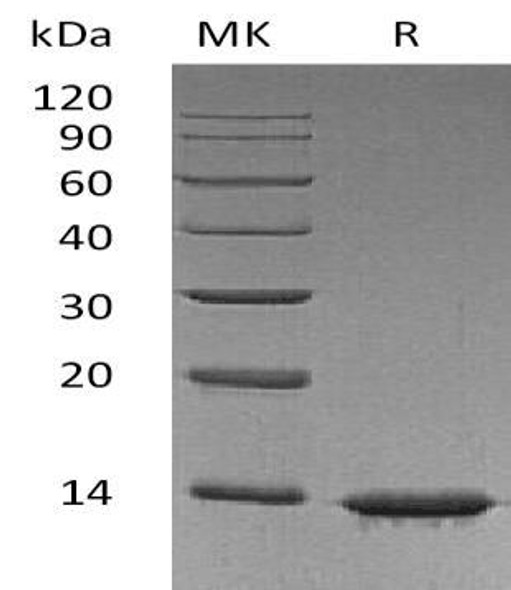Growth Factors & Cytokines Recombinant Proteins
Human Leptin Recombinant Protein (RPPB5738)
- SKU:
- RPPB5738
- Product Type:
- Recombinant Protein
- Species:
- Human
- Uniprot:
- P41159
- Research Area:
- Growth Factors & Cytokines
Description
| Product Name: | Human Leptin Recombinant Protein |
| Product Code: | RPPB5738 |
| Size: | 100µg |
| Species: | Human |
| Target: | Leptin |
| Synonyms: | OB Protein, Obesity Protein, OBS, Obesity factor. |
| Source: | Escherichia Coli |
| Physical Appearance: | Sterile Filtered White lyophilized (freeze-dried) powder. |
| Formulation: | Lyophilized from a concentrated (0.65mg/ml) solution with 0.003mM NaHCO3 Having 35-40% protein. |
| Solubility: | It is recommended to reconstitute the lyophilized Pegylated Leptin N82K in sterile water or 0.4% NaHCO3 adjusted to pH 8-9, not less than 100�g/ml, which can then be further diluted to other aqueous solutions. |
| Stability: | Lyophilized Pegylated Leptin N82K although stable at room temperature for 3 weeks, should be stored desiccated below -18°C. Upon reconstitution Pegylated Leptin N82K should be stored at 4°C between 2-7 days and for future use below -18°C. For long term storage it is recommended to add a carrier protein (0.1% HSA or BSA). Please prevent freeze-thaw cycles. |
| Purity: | Greater than 99.0% as determined by:(a)�Gel filtration analysis.(b) Analysis by SDS-PAGE. |
| Biological Activity: | Biological Activity is < than 0.1% as determined by inducing proliferation of BAF/3 cells stably transfected with the long form of human leptin receptor. This abolishment of activity results from drastically reduced affinity toward leptin receptor. |
Leptin takes an important part in the regulation of energy balance and body weight control.After entering the circulation, Leptin binds LEPRwhich results in the activation of several major signalling pathways. In the hypothalamus Leptin acts as an appetite-regulating factor that induces a decrease in food intake and an increase in energy consumption and also regulates bone mass and secretion of hypothalamo-pituitary-adrenal hormones. In the periphery, increases basal metabolism, regulates pancreatic beta-cell function and insulin secretion and affects innate and adaptive immunity.
Pegylated Leptin N82K Human Recombinant produced in E.Coli is �a single non-glycosilated polypeptide chain containing 146 amino acids, an additional Ala at N-terminus and one molecule of PEG 20 kDa at its N-terminus acids and having a molecular weight of 35.6kDa. However due to enlarged hydrodymanic volume it runs on the SDS-PAGE as 48 kDa protein and in gel-filtration on Superdex 200 as over 200 kDa protein. Pegylated Leptin N82K Human Recombinant was purified by proprietary chromatographic techniques.
| UniProt Protein Function: | leptin: May function as part of a signaling pathway that acts to regulate the size of the body fat depot. An increase in the level of LEP may act directly or indirectly on the CNS to inhibit food intake and/or regulate energy expenditure as part of a homeostatic mechanism to maintain constancy of the adipose mass. Defects in LEP may be a cause of obesity (OBESITY). It is a condition characterized by an increase of body weight beyond the limitation of skeletal and physical requirements, as the result of excessive accumulation of body fat. Belongs to the leptin family. |
| UniProt Protein Details: | Protein type:Secreted; Secreted, signal peptide; Hormone; Cell development/differentiation Chromosomal Location of Human Ortholog: 7q31.3 Cellular Component: extracellular space; cytoplasm; extracellular region Molecular Function:peptide hormone receptor binding; growth factor activity; hormone activity Biological Process: circadian rhythm; response to dietary excess; positive regulation of myeloid cell differentiation; regulation of fat cell differentiation; regulation of steroid biosynthetic process; female pregnancy; negative regulation of transcription from RNA polymerase II promoter; glucose homeostasis; positive regulation of luteinizing hormone secretion; negative regulation of appetite; positive regulation of tyrosine phosphorylation of Stat3 protein; response to insulin stimulus; response to vitamin E; positive regulation of MAPKKK cascade; regulation of cholesterol absorption; regulation of blood pressure; positive regulation of cell proliferation; positive regulation of ion transport; central nervous system neuron development; placenta development; positive regulation of cytokine production; cholesterol metabolic process; positive regulation of developmental growth; bile acid metabolic process; eating behavior; glucose metabolic process; adult feeding behavior; ovulation from ovarian follicle; leptin-mediated signaling pathway; negative regulation of vasoconstriction; tyrosine phosphorylation of STAT protein; fatty acid beta-oxidation; insulin secretion; glycerol biosynthetic process; energy reserve metabolic process; response to hypoxia; hormone metabolic process; regulation of gluconeogenesis; positive regulation of follicle-stimulating hormone secretion; positive regulation of insulin receptor signaling pathway; leukocyte tethering or rolling; regulation of insulin secretion; negative regulation of apoptosis Disease: Leptin Deficiency |
| NCBI Summary: | This gene encodes a protein that is secreted by white adipocytes, and which plays a major role in the regulation of body weight. This protein, which acts through the leptin receptor, functions as part of a signaling pathway that can inhibit food intake and/or regulate energy expenditure to maintain constancy of the adipose mass. This protein also has several endocrine functions, and is involved in the regulation of immune and inflammatory responses, hematopoiesis, angiogenesis and wound healing. Mutations in this gene and/or its regulatory regions cause severe obesity, and morbid obesity with hypogonadism. This gene has also been linked to type 2 diabetes mellitus development. [provided by RefSeq, Jul 2008] |
| UniProt Code: | P41159 |
| NCBI GenInfo Identifier: | 730218 |
| NCBI Gene ID: | 3952 |
| NCBI Accession: | P41159.1 |
| UniProt Secondary Accession: | P41159,O15158, Q56A88, |
| UniProt Related Accession: | P41159 |
| Molecular Weight: | 18,641 Da |
| NCBI Full Name: | Leptin |
| NCBI Synonym Full Names: | leptin |
| NCBI Official Symbol: | LEP�� |
| NCBI Official Synonym Symbols: | OB; OBS; LEPD�� |
| NCBI Protein Information: | leptin; obese protein; obesity factor; obese, mouse, homolog of; leptin (murine obesity homolog); leptin (obesity homolog, mouse) |
| UniProt Protein Name: | Leptin |
| UniProt Synonym Protein Names: | Obese protein; Obesity factor |
| Protein Family: | Leptin |
| UniProt Gene Name: | LEP�� |
| UniProt Entry Name: | LEP_HUMAN |






